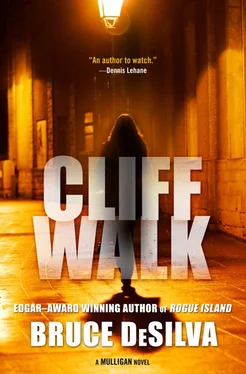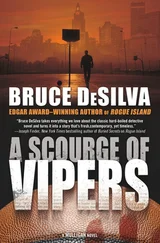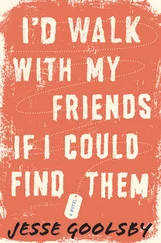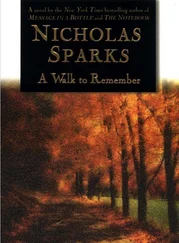After dinner, the Maniellas retired to their rooms. I went to the garage, found my parka still hanging on its peg, and pulled my antibiotics prescription and omeprazole tablets from an inside pocket. Then I reentered the house, passed Black Shirt and Gray Shirt standing watch in the foyer, and entered the library, where Yolanda was sitting on the couch.
“Not what you expected, are they,” she said.
“No.”
“You thought they’d be pigs.”
“Maybe they are,” I said. “All that dirty money can buy a lot of lipstick and deodorant.”
“They’re not,” she said. “They’re pretty nice when you get to know them.”
“Nice for pornographers, you mean.”
“I didn’t realize you were such a puritan, Mulligan.”
“Neither did I.”
She gave me a searching look. “Pornography is legal,” she said. “They’re not doing anything wrong.”
“A lawyer’s answer.”
“I am a lawyer. I leave the moralizing to the preachers.”
“Perhaps I’d like them better,” I said, “if they didn’t keep sending their thugs after me.”
“What do you mean?”
“The two ex-SEALs followed my car the other day and cornered me in a Subway parking lot.”
“What did they want?”
“To beat me up.”
“What happened? Are you okay?”
“I’m fine. I showed them my gun, and they went away.”
“You carry a gun?”
“Only when I’m feeling threatened.”
“Why were they after you?”
“Because I was asking questions about the Maniellas.”
“They didn’t seem to mind your questions today.”
“They didn’t answer the important ones.”
The candles in the candelabra had burned to stubs, and one of them had gone out. I relit it with my lighter.
“When are you going to tell Captain Parisi that Sal is alive?” I asked.
“Tomorrow, if the roads are better,” she said. “It’s something I should do face-to-face.”
“Taking Sal with you?”
“No.”
“Parisi’s going to want to question him.”
“I’m not going to allow that,” she said.
“Mind if I call the captain in the morning and give him the news myself?”
“Why would you want to do that?”
“Because it would amuse me.”
“I’d rather you didn’t, but I can’t stop you.” She paused and then added, “I guess it wouldn’t do any harm.”
I picked up the decanter of bourbon from the table and thought about how good it would feel on the way down. Then I thought about what would happen when it hit bottom and returned the container to the table.
“Patricia Smith is going to be at the Cantab in Cambridge the second week in January,” I said.
“Is that so?”
“They say her readings are amazing. We should go.”
“Maybe, but not together.”
“Separate cars would waste gasoline,” I said. “Don’t you care about the environment?”
“Going together would just encourage you,” she said.
Vanessa stepped into the library to announce that our beds would be ready shortly. Then she noticed the way I was looking at Yolanda and asked, “Will you be wanting one room or two?”
“One,” I said.
“Two,” Yolanda said.
Vanessa chuckled and slipped out of the room.
* * *
In the morning, Sal stood on the front porch with his wife and daughter and waved good-bye as Yolanda and I headed down the snow-covered dirt road to our cars. I helped her clear the snow from hers. Then I brushed off Secretariat. I locked my.45 in the glove box and placed a plastic bag holding Grant’s two-volume memoir on the floor by the front passenger seat. I started the car, turned on the heater, and let the engine warm while I made the call to Parisi.
“Guess who I was just talking to,” I said.
“I don’t play guessing games, Mulligan.”
“Sal Maniella.”
That five-second pause, and then: “You talking to dead people now?”
“Sometimes I do,” I said. “But he looked alive to me. He was walking and talking, and his breath turned white in the cold.”
“Seriously?”
“Yeah.”
“Because if this is your idea of a joke…”
“It’s not.”
“Then who the hell is in the morgue?”
“A retired Navy SEAL named Dante Puglisi. Sal had been using him as a double. They looked a lot alike, and Puglisi had some plastic surgery a few years back to perfect the illusion.”
A five-second pause again. “Plastic surgery scars were noted in the autopsy report, but we chalked it up to vanity.”
“I would have, too.”
“Sal’s been playing dead because somebody tried to kill him?”
“Yeah.”
“His wife played along by falsely identifying the body?”
“Sal’s lawyer claims she was distraught and confused.”
“You met her?”
“I did.”
“She seem confused to you?”
“No.”
“Did Sal tell you who wants him dead?”
“He says he’s got a lot of enemies.”
“I’ll bet. So where do I find him?”
“His lawyer,” I said, “isn’t going to let you talk to him.”
Parisi fell silent for a moment. Then he said, “Swell.”
“You sure you got it right this time?” Charlie said.
“I am.”
“’Cause you really fucked it up the first time around.” He smirked as he cleared away what was left of my eggs and topped off my coffee.
I opened my mouth to argue but then thought better of it. I’d never flat-out reported that Maniella was dead. I’d just written that police believed he was. But I’d also believed it, and I’d made sure my readers did, too. The paper would not be running a correction, because by journalism standards my story had been technically accurate. But that didn’t make it true.
Charlie was about to say something else when my cell phone interrupted with “Who Are You?”
“Mulligan.”
“I’m only going to say this once,” the caller said, “so listen up.” The voice was muffled-a man trying to disguise his voice. “Write down this address: 442 Pumgansett Street. Got that?”
“Got it. In the Chad Brown project, right?”
“Yeah.”
“What’s this about?”
“Big story for whoever gets there first. I suggest you haul ass.”
“What kind of story?” I asked, but I was talking to a dead line.
The worst places always seem to be named after the best people. Any Franklin Delano Roosevelt High School, Martin Luther King Drive, or Dorothea Dix Hospital is likely to be a war zone. Chad Brown, Providence’s oldest low-income public housing project, was named for one of the city’s leading seventeenth-century citizens, a man Roger Williams once described as “a wise and godly soul.” Its 198 cramped apartments were squeezed into twenty two-story red-brick row houses in the city’s Wanskuck neighborhood three miles northwest of the statehouse.
When the project was completed in 1942, the apartments rented for as little as eleven dollars a month, with preference given to defense workers. By the 1970s, it had become Providence’s most dangerous neighborhood, plagued by gangs, riddled with drugs, and terrorized by drive-by shootings. This year, the decent folks who lived there were working with the police, making another attempt to take back their neighborhood. Best of luck with that.
I parked Secretariat in the cracked macadam lot in front of 442 Pumgansett, got out of the car, and stepped in fresh dog shit. Folks who live on a battlefield don’t bother with pooper-scoopers. I scraped my Reeboks on the curb and started up the concrete walk, my Nikon dangling from my left shoulder. My Boston Bruins sweatshirt hung low in front, weighted down by the.45 I’d shoved into the hand pouch. I didn’t think I’d done anything to provoke the Maniellas and their goons again, but I had no idea what I was walking into.
Читать дальше












